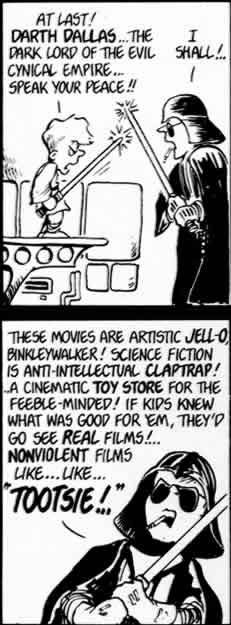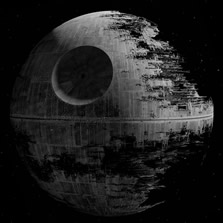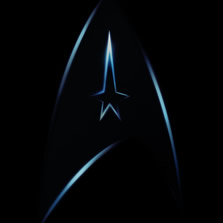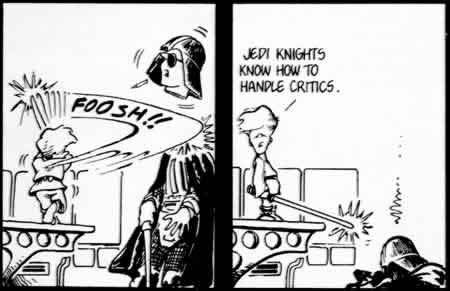Science Fiction Fans: Lower Your Standards!
Science fiction has to be graded on a curve. It’s still a trashy genre, particularly on the silver screen, despite its power to put more butts in seats than any other kind of film, and the culture-sculpting awesomeness of the best examples. My beloved genre still cuts corners on story and script, and even the best science fiction films created still fall short of the standards for greatness set in non-genre film. There has never been a Schindler’s List with aliens, no Shawshank Redemption with time travel, no Fight Club with killer robots. There has been great science fiction — but never yet a great film that happened to be science fiction.
Even if you disagree with that — and it’s in your contract; I would expect nothing less than howls of outrage and a list of candidates for greatness — most of us can probably mostly agree that the genre as a whole has a problem in the quality control department.
And we love it anyway.

I am a reluctant pragmatist: I figured out in the early 90s that if I was going to respect and enjoy a science fiction film more than about once per decade I’d have to lower my standards. And I did. Consequently, I was actually able to have a genuinely good time at many films released since then that I would otherwise have been obliged to turn up my snooty nose at.
I’m not impossible to please (just difficult)
Case in point: science ficton novels. There are quite a few science fiction novels that are Truly Great by any standard. Not quite as many as there should be …
I have a great fondness for science fiction, and I have a continuing faith in the form’s literary value and potential. But it is time to make a confession. In writing this book, a task which is necessitated a good deal of intensive reading and re-reading over a nine-month period, I have discovered that there are fewer than 100 masterworks in modern English language science fiction. No more than 10 or a dozen of these novels can be described as literary masterpieces. If one is in a generous mood, perhaps another dozen or so can be called masterpieces of their sort, but that still leaves over 70 which are decidedly less than masterpieces.
— David Pringle, Science Fiction: The 100 best Novels
Nevertheless, a dozen literary masterpieces — give or take a few, depending on how much you agree with Mr. Pringle — is a considerably better track record than science fiction has on the screen, because novels have some natural advantages. The special effects problem is not the best example, but it is the most obvious: science fiction films must do some really top-notch work with special effects (and/or writing around the need for them) before they stand a chance.
Consider Orson Scott Card’s extreme caution with the conversion to film of his (Truly Great) novel Ender’s Game. Card knows quite well that SF films tend to fall well short of their true potential … and he’s tried hard to protect his story from what Hollywood almost always does to science fiction.
I do think that there are non-SF films that are Truly Great. I mentioned three above, and there are many more. It’s not hard to come up with a good list of films that are more or less flawless in their craft.
Alas, even the best science fiction films have fairly obvious storytelling flaws. And there are many more that would be hard to enjoy at all if you didn’t cut them some slack.
Like Avatar.
Avatar as the ultimate example of a film that rewards your surrender
Avatar is the best recent example of the power of my methods. I really let myself love Avatar — saw it four times in the theatre — and I’m a better man for it.
And yet I cannot deny that Avatar’s story is simplistic to the point of being irritating. Here we have a film with obvious storytelling flaws — easy pickings even for a n00b of a film critic — that was nevertheless far superior to several other craptastic sci-fi blockbusters of recent history, especially and most recently: bloody Transformers, Terminator Salvation, the Predators reboot, Battle: Los Angeles, and the odious Prometheus. I couldn’t get my bar low enough to enjoy any of those.
You don’t even have to cite Avatar’s stunning visuals to defend it (although everyone does). Consider this: Cameron gave us an admirable, capable, disabled protagonist — a highly memorable character. How often do we see that? There was a 10-year-old-boy in a wheelchair near me when I went to see it. His eyes were huge. He was permanently affected in the best possible way. Avatar may have been simplistic, but at least it had at least one character you won’t forget, a dramatically sound structure, and plotting that wasn’t full of logical wormholes.
SF fans, we have a heavy cross to bear: our beloved genre is mostly crap, and we have to grade on a curve. And, grading on a curve, Avatar was clearly at least a B for most people. Judged honestly against all film, though, it’s more like a D.
I really don’t like having to defend any movie with the “you have to accept it for what it is” gambit — it always sounds to my ears like “to like this crap, you have to admit that it’s unlikeable and then forgive it.” So I didn’t lower my standards all the way, and occasionally I still get really, really pissed at the lost opportunities (Prometheus!), the greatness that might have been with just a little more respect for the genre.
James Cameron could have done so much more with Avatar, for instance — imagine if he’d dialed down the “noble savage” nonsense a notch, maybe given them a cultural blemish or two? Made the corporate baddy more nuanced and complex, like his doppleganger, Burke, in Aliens? Such changes would not have been much more than script tweaks, and yet they would have nudged the story towards greatness.
I both love and hate what James Cameron himself said in his defense (I forget where):
It’s just a story, people. I made it up. I had fun.
I love that. And hate it. And love it. It’s so true. And so maddeningly inadequate. And yet so true!
Thanks to my lowered standards, I am generally able to actually enjoy myself far more often than I would if I actually expected SF to be truly “good.”
So, er … just how low do we sink?
The trouble with lowering your standards is: where do you stop? Where do you draw the line? Story does matter. Story makes the world go round. There’s nothing “just” about story, Mr. Cameron, and SF fans need to draw a line in the sand and demand that it be abused only so much.
So where is that line?
I have a few suggestions for benchmarks. Of course.
It doesn’t matter, of course, whether you agree with me a that a given film makes the cut or not; it’s the exercise in trying to find the line that matters. If we’re trying to forgive science fiction for some of its stupidities, but not too many of them, what happens in certain famous (or infamous) cases? The Star Wars, Trek, Matrix and Alien franchises all contain good and familiar examples …

Obviously Star Wars episodes IV and V make the curved grade, while episodes I and II equally obviously do not — the latter were crimes against story, and Lucas deserves our contempt. The third film in both trilogies, old and new, each awkwardly wobbled right on the line. Jedi got the benefit of the doubt. Poor Sith, though, was more obviously mediocre. The key to the entire saga, Annikin’s turn to the dark side, was arbitrary and emotionally flat — he didn’t even face a genuine emotional dilemma, which is how characters generally get corrupted — and the whole franchise had been too abused by then to get much forgiveness from the earlier generations of fans.

The Matrix, released the same year as Phantom Menace, passes with flying colours — far above the line. Reloaded was initially acceptable on the condition that the confusing story was actually going somewhere, but it clearly fell below the line when our fears were confirmed by Revolutions that the Wachowski Bros. had simply been bullshitting us, alas.

How about Star Trek? So easy. We’re grading on a curve, so we just put Wrath of Kahn somewhere near the top, Shatner’s outrageously bad V at the bottom, and distribute the others accordingly. Of course Wrath probably doesn’t quite deserve to be ranked as high as the best of the entire genre, but the Trek franchise is probably the ultimate example of science fiction that should and must be forgiven much silliness if it is to be enjoyed — and indeed it is routinely forgiven, thanks to our love of the characters, and our nostalgia.
I think Abrams’ 2009 makeover of Star Trek gives us a bit of trouble, though. Because it played directly (and brilliantly) to our love of the characters and our nostalgia, the Trek audience did indeed wholeheartedly forgive this film … for a time-travel plot so goofy and strained that, arguably, it should not have been forgiven. I definitely did enjoy this film — the feel of it was really just perfect — but its non-story revolved around as silly a Trek villain as we’ve ever seen, a villain without half the timeless charm of Montalbán’s Kahn. When the excitement has worn off, will we still think this was as good as Wrath? I’m not sure that we will.

Alien and Aliens are right at the top of the adjusted grade scale, both films achieving sci-fi greatness (in totally different ways) while Resurrection, the AVP films, and Ridley’s tragically awful Prometheus have been destroying the franchise ever since. The awkward one is Fincher’s Alien3-with-the-3-pointlessly-superscripted-suggesting-what-exactly? I think 3 makes the cut — barely. It’s a film I was certainly honour-bound to loathe if I hadn’t lowered my standards, yet I found quite worthwhile once I muted that brie-eating inner critic. Obviously the story went more or less off the rails, taking us backwards instead of surging ahead to Earth, where it should have gone, d’oh. And yet it’s beautifully filmed and performed, and I’d be a poorer man if I rejected it. I think the whole film is worth it for the cafeteria science, featuring what must be the most heartfelt, gobsmacked rendition of the word “Fuck!” in the history of cinema. Thanks to actor Danny Web for that.
Uh … you know, it wasn’t a question of doing everything differently, although they changed the ending, it was mostly a matter of doing everything wrong. They said the lines...mostly...but they said them all wrong. And they cast it wrong. And they designed it wrong. And they scored it wrong. They did everything wrong that they could possibly do. There’s actually a fascinating lesson in filmmaking, because everything that they did reflects back to the script or looks like something from the script, and people assume that, if I hated it, then they’d changed the script … but it wasn’t so much that they’d changed the script; it’s that they just executed it in such a ghastly fashion as to render it almost unwatchable. (Pauses) Good times.
And what about 2012’s Prometheus? There was no hope of enjoying it, even leaving all my standards at the door. That film goes well out of its way to irritate anyone with an ounce of sense. I could not possibly have been more willing to enjoy a film, and I was still horrified by it. I had been waiting years for Ridley to “rescue” the Aliens franchise and give us a good taste of what made Alien great: grit and grease and tension, Giger’s designs, the best movie monster of all time, and characters so real you felt like you were in space with them. Instead, within ten minutes I was muttering, “Are these idiots for real?” My dire review.
Other fence-sitters and miscellaneous tricky cases that come to mind:
- Pitch Black and Chronicles of Riddick — both films I desperately wanted to love, but which both suffer from many glaring, classic SF glitches. Were they good? No. Would I watch them again? Yes.
- Lost was mostly well above the line for at least three seasons, but sunk so far below my standards in the end that its merits could no longer be detected even with a powerful merit-o-scope. What did it add up to? Hell if I know. The ending made me about as mad as I’ve ever been at a television. But it would suck not to have experienced the early days of the series. Precisely the same can be said of X-Files.
- The BSG reboot, with it’s infamously underwhelming ending. In season two I was already snarking at the intro, “They so do not ‘have a plan’!” I was right. And yet the hope that it would all come together somehow was so yummy, and it generally did come together compared to, say, Lost. A pass.
- Inception, again much praised and brilliant in its way, was too much like a puzzle to be emotionally engaging, a movie as appealing as a giant sudoku. Without warmth, a huge running time, the tedious and ridiculous Bond-ian snow fortress sequence, and obvious complexity issues that Nolan couldn’t iron out in a decade of script revisions, I couldn’t lower my standards quite far enough to enjoy it.
- Both Iron Man films perfectly straddled the line: fun romps with moments of excellence … and totally crap scripts.
- 2009’s peculiar little Moon, much praised and brilliant at moments … and also basically just a long and silly Twilight Zone episode. Right on the line for me.
- 2010’s Cowboys & Aliens and 2011’s Total Recall reboot have a lot in common, and both fit into the guilty pleasure category for me: neither is remotely good enough to deserve actual praise, and yet both can be enjoyed if your standards are flexible. Both films feature good actors, interesting and creative visuals, and lots of fun action. Neither film has much of a script or a soul, alas. neither one takes itself very seriously, and both deliver exactly what was promised: science fiction
Want to comment?

Outraged that I don’t recognize Battlefield Earth as truly great cinema? Knickers twisted because I won’t genuflect at the mention of Chris Nolan? I will be publish responses to this article that amuse me, but you’ve got to send them to me and you must use apostrophes correctly (here’s a handy guide) or I will ignore you.
Tumblr blog Rational Basis responds:
The American Film Institute’s most recent list of the top 100 films of all time features at least four great science fiction movies, three with aliens. Star Wars (13th), 2001: A Space Odyssey (15th), E.T. (24th), and Blade Runner (97th).
Of Sight & Sound’s various, well-respected top 10 lists, 2001: A Space Odyssey was ranked 10th in 1992 and moved up to 6th in 2002. On S&S’s Critic’s Top Ten Films of the last 25 years (2002 poll), Blade Runner ranks 7th.
Blade Runner, Brazil, E.T., The Fly, Invasion of the Body Snatchers, Metropolis, and Star Wars all show up on Time’s ALL-TIME 100 Movies list.
So yeah.
Great response! Of course I expected to get that a response like that very quickly, and I did. I will now put that in my pipe and smoke it. My rebuttals: (1) there sure aren’t many of them, and even if a couple of them really are Truly Great it doesn’t really do much harm to my broader point that the genre as a whole as a quality-control problem. And (2) I think those films may well derive their alleged “greatness” from their cultural importance and from grading on a curve, and not because they actually compete with non-genre film in terms of story-telling awesomeness.
Rob Tarzwell, Joe Fulgham and many more are both amazed that I don’t think Blade Runner is Truly Great
Rob:
Fun read, but my god, man, Blade Runner requires no curve, surely! It is still the movie that gets to decide how movies are made.
Joe:
I saw this post while waiting in line at Save-On foods and rushed home to respond with ‘BLADE RUNNER WHAT IS WRONG WITH YOU?’
Joe actually rejects my premise wholesale:
Any unequal footing sci-fi has is simply due to prejudice by the audience rather than any lack of merit or predetermined lack of quality due to genre.
Apparently I see some glaring flaws where Joe finds none. Maybe a glitch in my visor …
But what about Blade Runner? What do I have to say for myself about that film? BR’s most obvious flaw is that it is just not very dramatically engaging. It’s long and not terribly interesting! It’s all mood and little action. I am NOT saying that BR actually fails as a film for lack of action, because that would be silly. I’m saying it fails to be all-the-way great for lack of some more action. I’m saying it’s a film with many extremely fine qualities … but that is just too moody and tedious and wears its Philiph K. Dickian themes on its sleeve. (While simultaneously abusing the source material quite badly, as many have pointed out.)
An anonymous IMDB reviewer summed it up like this:
Every movie geek that wants to secure their geek cred will go out of their way saying this movie is awesome and the best thing to happen to sci-fi since the invention of movies. In reality, they are loath to admit that it's a boring, overrated piece of cinematographic crap that nobody outside the community actually likes.
Now, I would never have put it quite like that myself, because I actually really like the film in so many ways ... but I thought it was an interesting one to quote, because it shows that there is definitely a lack of consensus about the greatness of this film. No film can win over everybody, of course, but go have a look at the “hated it” reviews on IMDB ... they go on, and on, and on. Lots of people have founds lots of reasons to not only find BR less than “great,” but far worse.
Brian Lynchehaun reminds us that not all SF is white bread
I would agree that most scifi movies made by Holywood are shit (just action movies with robots/spaceships), but scifi is certainly not entirely encompassed by "American media" nor "movie". Check stuff outside of those two categories, and there's glorious stuff for the asking.
Quite so. And I’m in no good position to judge. I simply haven’t gotten into foreign SF. I will say that I have sampled some of the most prominent examples — presumably the best — and I have never been blown away. Take Akira, for example. Does it have some greatness in it? Sure. Is it Truly Great? Don’t make me laugh: tentacle porn with delusions of grandeur and way too long a running time.
Chris Clugston makes a good point I wish I’d made about why science fiction tends to be of poor quality
The main reason sci-fi films are held in lower regard is they tend to be plot driven and self concious in the futuristicness (if that's a word). The "great movies" tend to be character driven , they don't need exposition to familiarize the audience with the limitations of the future world because they take place in a world we know. On the other hand what would be the point of placing human drama in the distant future, why have laser pistols if you're not going to fire them?
Yep, that is definitely one of the main problems with science fiction, one of the reasons it’s difficult: it’s just hard to do it well.